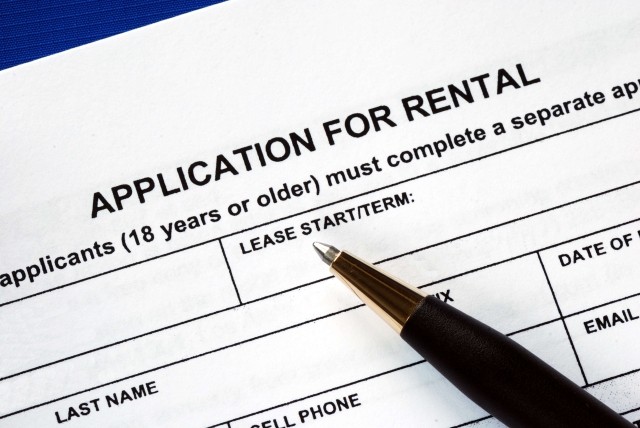As a landlord, finding the right tenant is essential for your rental property to be successful and profitable. Asking the appropriate questions during the screening process is important because it helps determine who could be a great long-term tenant. You’ll also save time and money by only conducting credit and background checks for applicants that meet your criteria. If you use Apartments.com Rental Tools, you’ll be able to easily manage online applications and properly screen tenants. Unlike our competitors, who use various third-party resources to collect information, we partner with TransUnion to provide you with screening reports for evictions, credit, and criminal history. Another feature you’ll find only on Apartments.com is support for co-signers, guarantors, and co-applicants. If you need more information to make a decision, you can request supporting documents from potential tenants directly on our platform.
For most landlords, an ideal tenant is someone who pays rent on time, has good credit, has no evictions, has great references, and makes at least three times the rent (an industry standard). Although landlords have the right to choose who to rent to, remember to keep fair housing laws in mind. Every question you ask should be business related. There are many important questions to ask potential tenants, but here are some common examples of information you should request from a potential tenant on a rental application.
1. Personal Information
Getting personal information is necessary for every rental application. You’ll also need this information to contact the tenant, verify basic details, and perform credit and background checks. Below is some of the information you should collect from every applicant:
- Full Name: Request the applicant's legal name to ensure accurate documentation and background checks.
- Date of Birth: Obtain the applicant's date of birth to verify identity and ensure compliance with age restrictions if applicable.
- Contact Information: Gather current contact details, including phone numbers and email addresses, for effective communication throughout the leasing process.
Although landlords can legally request social security numbers, it’s not required or recommended. Collecting social security numbers requires secure recordkeeping, and landlords must follow strict state laws regarding the storage of personally identifiable information. If you collect social security numbers, you increase your chances of being held liable if the applicant’s identity is stolen. Collecting social security numbers can also create a sense of distrust since you’re asking an applicant to share sensitive information without a guarantee of having their application approved.
2. Employment History and Monthly Income
This section will help you determine the applicant’s employment status and work history. Ask for their current employer’s name, their start date, title, and monthly pre-tax income. Ask the applicant if they can meet the income requirements of making three times the rent and if they can provide proof of income via pay stubs, bank statements, tax returns, or a new job offer letter. Include a section for additional income information for applicants who are self-employed or have multiple income sources from side jobs. The overall goal here is to determine if the applicant has a steady income and can afford rent.
3. Rental History
Rental history is a pivotal aspect of tenant screening, offering valuable insights into an applicant's past behavior as a tenant. It'll tell you where your prospective tenant has lived, how long they stayed, and whether they were reliable in paying their rent. Below is some of the information you should collect from every applicant:
- Current Address: Obtain the current residential address to verify stability and assess potential commuting distances.
- Previous Rental History: Obtain details of the applicant's rental history, including past addresses, landlord contact information, and rental durations.
- Reason for Leaving Previous Residence: Inquire about the reasons for leaving previous rental properties to identify any potential red flags or recurring issues.
- Length of Residence: Inquire about the duration of the applicant's current tenancy to gauge stability and reliability as a tenant.
- Reason for Moving: Understanding the motive behind the applicant's desire to relocate provides insights into their housing preferences and potential concerns.
4. References
Ask the applicant if you can reach out to their current employer and former landlord(s) to verify that the information they provided is true. It’s common for landlords to ask to speak with at least two references. Co-workers, college professors, and former managers can also be used as rental applicant references. When contacting references, remember to ask everyone the same standard questions and to comply with fair housing laws.
5. Deposits and Fees
Deposits and fees play a crucial role in protecting your interests and ensuring financial security throughout the duration of a lease agreement. Including clear information about deposits and fees in your rental application helps establish transparency and sets expectations for both landlords and tenants. Here are questions to ask about deposits and fees in your rental application:
- Will you be able to pay the application fee?
- Will you be able to pay the security deposit when you sign the lease?
- If applicable, can you pay for the pet rent, deposit, and fees?
You can’t deny a potential tenant based on their answers, but it helps them prepare for the move and sets the tone for your expectations.
6. Pets
Pets are a significant aspect of many tenants' lives, and addressing pet-related matters in your rental application is essential for establishing clear expectations and ensuring harmony between tenants and landlords. Here are some pet-related questions to ask in your rental application:
- Do you have pets?
- How many?
- What type, breed, and size?
Note that landlords are obligated to provide reasonable accommodations for tenants who have assistance animals.
7. Evictions and Bankruptcy
Ask your applicant if they have ever been evicted from a rental property. Although you should proceed with caution when renting to tenants who have an eviction in their rental history, keep in mind that there are various reasons for evicting a tenant. For example, a tenant who fell on hard times and is now financially stable might be a better fit than someone who was evicted for extreme property damage or multiple lease violations.
Although it’s not a common requirement, you can ask if the applicant has filed for bankruptcy in the past seven years. You can also ask if the applicant ever refused to pay rent on time. Rent refusal usually happens during a landlord-tenant dispute, so it’s good to be aware of this information. Multiple rent refusals could be a red flag. Include space for an explanation if you ask about bankruptcy or refusal to pay rent.
8. Relevant Crimes
Considering an applicant's criminal background is a crucial aspect of tenant screening to ensure the safety of the rental property and its occupants. While it's important to handle queries about criminal records sensitively and in compliance with fair housing regulations to prevent discrimination, you may inquire: "Have you been convicted of any relevant crimes?" It's advisable to refrain from directly questioning tenants about prior arrests or charges, as this information is revealed in background checks. Remember, having a blanket policy of rejecting applicants with convictions violates the FHA. However, landlords may reject applicants with criminal records posing a proven risk to property or other tenants, like burglary or arson.
9. Smoking
Smoking policies play a crucial role in managing rental properties by directly impacting tenants' health, safety, comfort, and the property's maintenance. It is vital to inquire about smoking habits when screening potential tenants. Key questions include: Do you smoke? Will you smoke on the premises? How many occupants smoke? These inquiries are crucial due to the potential for significant property damage from smoking. Reiterate the non-smoking policy in the lease to emphasize that smoking violates the terms. Landlords retain the right to reject applicants who smoke.
10. Number of Tenants
Be sure to ask your potential tenant about the number of tenants that will occupy the unit. Some states and cities enforce legal occupancy limits for bedrooms, so asking this question helps maintain compliance. Remember to adhere to fair housing regulations in dealings with families. Landlords are prohibited from inquiring about the number of children or pregnancy status. Additionally, it is important to include all individuals aged 18 and above on the lease.
11. Logistical Questions
Verbally (or virtually, depending on the situation), ask the applicant if they are familiar with your rental application process before they complete the form. You can also ask them if they have any questions or concerns after the form is completed. Asking these questions illustrates your professionalism while helping the tenant understand what to expect.
Questions to Avoid Asking Potential Tenants
When asking potential tenants questions, it’s crucial to adhere to the Fair Housing Act. Avoid inquiries related to national origin, disabilities, children, gender, or religion to prevent discrimination issues that may lead to lawsuits. Establish reasonable tenant standards like income three times the rent or a positive rental history. Consistently apply requirements like proof of income to all applicants to ensure fairness in the screening process without any preferential treatment.
Additional Tenant Screening Tips
Once the application is complete, it’s good practice to have applicants undergo further screening by running a credit and background check. Apartments.com Rental Tools makes the screening process easier by allowing you to manage applications and properly screen tenants online. If you use Apartments.com Rental Tools, you’ll receive comprehensive credit, criminal, and evictions reports from TransUnion. Remember to collect the same information from all applicants to make the process fair and have set requirements for your ideal tenant ahead of time. As always, make sure to review your local and state laws to confirm your rental application is compliant. Hopefully, you’ll be able to offer your rental to the most qualified tenant in no time. Good luck!











